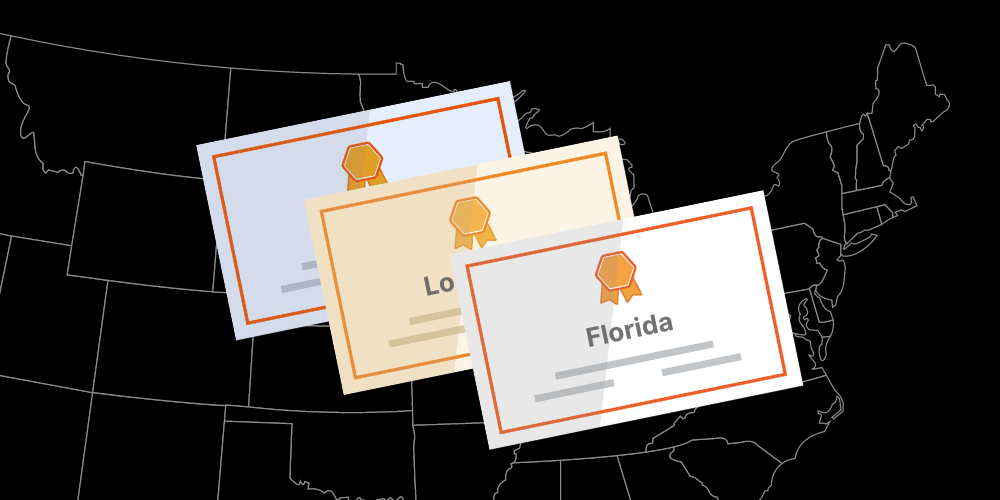— 6 min read
The South Dakota Contractor License: Guide to Registration & Requirements

Last Updated Jun 6, 2024

Tom Scalisi
Contributing Writer
59 articles
Tom Scalisi is a writer with over 15 years of experience in the trades. He is passionate about educating contractors and specialty contractors about the best practices in the industry. He has seen first-hand how education, communication, and preparation help construction professionals overcome challenges to build a strong career and thriving business in the industry.
Last Updated Jun 6, 2024

If you're starting a construction business in South Dakota — or expanding there from another state — a key first step is knowing the rules and requirements around proper contractor licensing and registration. Most licensing in South Dakota is handled on a local level rather than a state level, and there are different requirements depending on what kind of work a contractor performs. This quick guide will sum up the rules and requirements around the South Dakota contractor license.
Contracting in another state? Check out The Ultimate Guide to Contractors License Requirements in Every State.
Table of contents
Who needs a contractor license in South Dakota?
South Dakota is unique: The majority of the population lives in just a few centralized areas, and it affects how the state handles contractor licensing.
South Dakota leaves the majority of licensing up to the local jurisdictions. The only contractors required to carry state-issued licenses in South Dakota are electricians and plumbers. Everyone else works with a local city or county in regard to licensing.
One thing that applies to everyone? All contractors engaged in construction need to register for a South Dakota Contractor’s Tax License with the Department of Revenue.
Is there a general contractor license in South Dakota?
While there are licenses for general contractors in South Dakota, they aren’t issued by the state. Instead, some individual cities and counties issue residential building licenses, which are generally the same.
However, general contractors specializing in commercial construction have very little regulation to deal with.
How to get a contractor license in South Dakota
The rules about who needs a license and how they can get them depend on several variables. Electricians and plumbers need state-issued licenses, while GCs in one city might need a license — but not in the neighboring town.
We’ll cover these scenarios in a bit, but let’s first look at some tax considerations.
How to get a South Dakota contractor excise tax license
The South Dakota Department of Revenue requires all contractors who enter “into a contract for construction services” to carry a South Dakota contractor’s excise tax license. This includes contractors who repair or remodel existing real property and those who build new structures.
Contractor tax license applicants can find their application listed on the Department of Revenue’s website under “Apply for Business Tax License,” and they can apply entirely online. The information required is fairly straightforward, requiring just business type and company or owner identifying information.
How to get a South Dakota electrical contractor license
Electrical contractors in South Dakota must pursue licenses through the Department of Labor and Regulation. The requirements are relatively minimal:
- Carry a South Dakota journeyman electrician’s license for at least two years (4,000 hours)
- Fill out this application, and have it notarized
- Secure a $10,000 surety bond
- Complete this verification form
The cost for applying is $50, and the cost for biannual renewal is also $50.00.
How to get a South Dakota plumbing contractor license
Like electricians, plumbers will have to pursue licensing through the Department of Labor and Regulation. To apply for a contractor’s license, you must:
- Have six years of experience as a plumber
- Have spent at least 1,900 hours per year during those six years as a plumbing contractor, plumber, or plumber’s apprentice
- Fill out the plumbing contractor application (which is the same application for all plumbing license types)
- Pay for the exam and licensing fee, totaling $375
How to get a South Dakota contractor license at the local level
Several of the cities throughout South Dakota have their own rules for contractors. The following includes some of the most populated cities as well as the regulations they require of contractors.
Sioux Falls
Sioux Falls doesn’t take the same laid-back approach to licensing that the state does. Instead, it requires all contractors performing work on residential one and two-family homes to carry licenses for work that requires a permit. And just about everything requires a permit in Sioux Falls — including sheds, decks, shingles, sheetrock, replacing exterior doors, and more.
The Residential Building Contractor license requires the applicant to take and pass the Construction Supervisor Examination, which is an open-book test held by the city. The requirements are:
- Fill out the residential business contracting license application
- Submit proof of a $20,000 bond
- Submit proof of $300,000 general liability insurance
- Pay the $75 application fee
Stay updated on what’s happening in construction.
Subscribe to Blueprint, Procore’s free construction newsletter, to get content from industry experts delivered straight to your inbox.

Electrical and plumbing
The City of Sioux Falls takes electrical and plumbing licensing even further. Applicants must hold a state-issued license, but the city will still require them to take and pass an examination.
Electrical contractors must:
- Fill out the electrical contractor's license application
- Submit proof of a $10,000 bond
- Pay $75 application fee
Plumbing contractors must:
- Be a master-level plumber
- Fill out the master plumbers license application
- Submit proof of $10,000 bond
- Pay the $75 application fee
Rapid City
Rapid City will most likely require the majority of contractors to carry city-issued licenses, but information is sparse. The city’s website states:
Aberdeen
Aberdeen, South Dakota, requires licenses for most contractor types, but the city keeps contractor licensing requirements under wraps. The city’s website states:
Regulated contractors that require licenses include:
- Residential building contractors
- Plumbers
- Excavators
- And more additional categories
Brookings
The only contractor types that Brookings, South Dakota, licenses are plumbing and residential contractors. Applicants will use the same paper application as circuses, carnivals, and pawnbrokers.
The requirements for plumbing contractors are:
- Pay a $50 fee
- Submit proof of a $1,000 bond
- Copy of state-issued plumbing contractor license
- Submit proof of $50,000/$100,000 general liability insurance
The requirements for residential building contractors are:
- Pay a $75 fee
- Supply a tax excise number
- Provide proof of worker’s compensation insurance
- Provide proof of liability insurance in the sum of $500,000 or more for each occurrence
Watertown
Watertown, South Dakota’s Community Development Building Services Department only requires licenses from residential building contractors. After filling out the online application, contractors must also complete the following:
- Pay a $60 fee
- Provide proof of $500,000 liability insurance policy
- Proof of worker’s compensation insurance
Penalties for unlicensed contracting in South Dakota
South Dakota doesn’t require many contractors to carry a contracting license, but it’s serious about its tax excise requirements. Contractors who don’t carry the appropriate tax excise license are guilty of a Class 1 Misdemeanor and can expect to pay fines up to $1,000 and possibly spend up to a year in jail. Continuing to contract can boost the fines up to $4,000 or up to two years in jail.
Beyond South Dakota’s laws, each municipality has the ability to impose its own fines and penalties. Unlicensed contractors can expect to pay thousands of dollars if they don’t get the appropriate licenses.
South Dakota’s mechanics lien laws do not explicitly require a contractor to carry a license to file a mechanics lien. But, just because the state’s law doesn’t require a license doesn’t mean you shouldn’t carry one: If you have to enforce your lien, performing unlicensed work may not help your case.
Was this article helpful?
Thank you for your submission.
78%
22%
You voted that this article was . Was this a mistake? If so, change your vote
Scroll less, learn more about construction.
Subscribe to The Blueprint, Procore’s construction newsletter, to get content from industry experts delivered straight to your inbox.
By clicking this button, you agree to our Privacy Notice and Terms of Service.
Thank you!
You’re signed up to receive The Blueprint newsletter from Procore. You can unsubscribe at any time.
Categories:
Written by

Tom Scalisi
Contributing Writer
59 articles
Tom Scalisi is a writer with over 15 years of experience in the trades. He is passionate about educating contractors and specialty contractors about the best practices in the industry. He has seen first-hand how education, communication, and preparation help construction professionals overcome challenges to build a strong career and thriving business in the industry.
View profileExplore more helpful resources

Contractor License Bonds: Everything You Need to Know
In order to perform construction work, many states require contractors to be “licensed and bonded.” What does that mean? Well, every state sets its own rules for contractor licensing, and...

Contractor’s Guide to License Reciprocity: Working Across State Lines
For many contractors, growing a construction business means taking on jobs in different states. Whether it’s to take a one-off project or to establish a new business location, working in...

Vermont Contractor License: Guide to Rules & Requirements
If you’re starting a construction business in Vermont or looking to expand your business from another state, being properly licensed to work is one of the first key steps. There...

The Maine Contractor License: Guide to Rules & Requirements
If you’re considering starting a contracting business in Maine, it’s important to know the rules and requirements for proper licensing. Maine takes a different approach to contractor licensing than most...
Free Tools
Calculators
Use our calculators to estimate the cost of construction materials for your next project.
Templates
Find a template to help you with your construction project tasks.
Material Price Tracker
Get the latest U.S. retail prices and view historical trends for common building materials.
Glossary
Explore key terms and phrases used in the industry.
